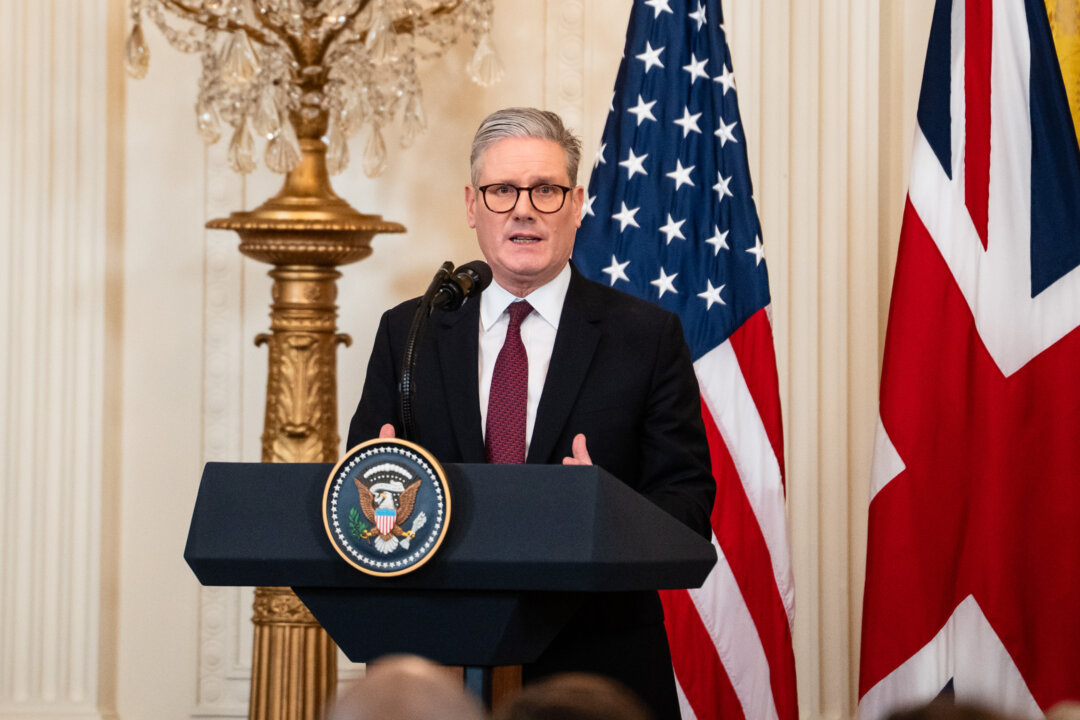Improving Child Health: Government-Run Health Care Is No Remedy

(PeopleImages via Getty Images)
President Donald Trump told our new Department of Health and Human Services Secretary Robert F. Kennedy Jr. to “go wild” on health. Backing up Kennedy, Trump issued an Executive Order to create a special commission, chaired by Kennedy himself, to investigate, report, and recommend strategies to combat chronic disease. Importantly, the health of American children is the primary focus of this ambitious effort.
Kennedy’s task is enormous, and perhaps providential. In a major public speech, well before taking the helm of HHS, Kennedy revealed the depth of his commitment: “For 19 years, I have been praying every day when I get out of bed that God will put me in a position to end the chronic disease epidemic so we can restore health to our children.”
Childhood Illness
In his February 2025 order, Trump outlined the urgency of the problem: “In 2022 an estimated 30 million children (40.7%) had at least one health condition, such as allergies, asthma, or an autoimmune disease. Autism spectrum disorder now affects 1 in 36 children in the United States—a staggering increase from rate of 1 to 4 out of 10,000 children identified with the condition during the 1980s. Eighteen percent of late adolescents and young adults have fatty liver disease, close to 30% of adolescents are prediabetic, and more than 40% of adolescents are overweight or obese.”
President Trump orders the new commission “to aggressively combat the critical health challenges facing our citizens, including the rising rates of mental health disorders, obesity, diabetes, and other chronic diseases.” ?
A New Focus
Kennedy’s accession to leadership in health policy marks a significant shift in the national debate from access to health care coverage to the actual improvement of health itself. Doug Holtz-Eakin, President of the American Action forum and former Director of the Congressional Budget Office nails it: “The reality is that most of what makes us healthy or unhealthy has nothing to do with health care. The vast majority of our health, more than 80% by most estimates, is determined by genetics, environment, diet, exercise, and other factors such as the use of alcohol, drugs and tobacco. If you want to improve health, this is where you should focus.”
But this shift does not mean an end of the debate over health coverage and financing. The Left is persistent, insisting that government control is the shining path to better health. In 2020, the People’s Policy Project proposed a phased-in program of government-run health insurance beginning with the kids, from birth to 25: “Medicare for Kids also creates conditions that should push further Medicare expansion as individuals who age out of Medicare will be an obvious constituency for finishing the job and bringing in the 26 to 64 age group.”
The goal of “Medicare for All” legislation, as Senator Bernie Sanders (I-Vt.) reminds us, is not only to lower overall lower costs, but also to have better “health care for all,” including children.
Government Coverage Myths
Here’s the problem. Such a program does not—and cannot—guarantee access to health care for all, let alone quality care for all. The British National Health Service—the grand-daddy of “single payer” health care—has waiting lists for medical care that now top 7.5 million cases, more than 10% of the entire British population.
The British system was created in 1948. If a “single payer” system of financing and public provision is somehow superior to a private or a mixed public/private delivery system—“for all”—then the National Health Service should be a model for superior child health care. In fact, the service has been struggling mightily to reverse Britain’s declining performance in providing health care to children. For example, in 2020, researchers writing in the British Journal of General Practice reported that British infant mortality is “currently 30% higher in the UK than average for similarly developed countries and is predicted to be between 80% to 140% higher by 2030.”
According to these British researchers, “The current structure and delivery of health care in the UK also impedes progress. Young people have distinct healthcare needs that are not often met by services, reflected by them reporting the poorest NHS (National Health Service) experience of any age group.” (Emphasis mine.) Moreover, they noted, “Asthma death rates among 10–24-year-olds are the highest in Europe, and there is a high all-cause burden of disease.”
In 2024, Professor Katie Harron of the University College of London reported that more than 20% of English children are overweight or obese by age 5. Moreover, echoing the findings of her British colleagues four years earlier, she says that British infant mortality is very poor, with performance ranking much lower, 30th out of 49 member countries of the Organization of Economic Cooperation and Development.
Writing in the Journal of Pediatrics (2016), Ingrid Wolfe and colleagues noted, “Compared with other (European Union) member states, plus Australia, Canada and Norway, the UK has not matched the historical gains made in child, adolescent and young adult mortality in the last 40 years.”
Child Mental Health Treatment Deteriorating
Childhood mental health conditions fare no better, either in Britain or in Canada. But that’s hardly new. Wolfe and her colleagues further noted that government budget cuts for child mental health services took a heavy toll: “This disinvestment is reflected in increased waiting times for services, and a recent report that only 40% of Child and Adolescent Mental Health Services nationally are able to provide acute care.” Options are limited.
Long waiting lists, of course, are a striking feature of Canada’s “single payer” health system, reaching a record level in 2024. COVID-19 was devastating for children in both Canada and United States, but the pandemic made wait times worse for Canadian kids with substance abuse or mental health disorders.
According to a 2023 report from the Canadian Institute for Health Information, “While hospitalization and ER visits remained stable or decreased, the data available indicates that children and youth were waiting on average, about 36 days to access community mental health and counseling services in 2022, compared with 27 days in 2020.”
Unsurprisingly, wait times for pediatric surgeries in Canadian hospitals are also unacceptably long by any reasonable standard.
Better Options
High-quality hospitalization is a feature of American health care. Examining the global data on children’s hospitals specifically, Doug Holtz-Eakin further reports, “Countries with single-payer health care lag far behind the United States in the number of high-quality pediatric hospitals. Of the world’s top pediatric hospitals, the United Staes claims 28%—more than a quarter. Even among the top ten hospitals, one half belong to the United States, and no other country claims more than one. Finally, the median rank (within the 250) of a U.S. hospital is 72, the best performance of any country with a large number of children’s hospitals. In short, by most measures the United States outpaces single-payer countries in terms of the quality of its pediatric care.”
American health care is far from perfect, but America’s performance in the process of care delivery is very good in comparison with most other advanced countries, especially “single payer” countries such as Canada and the United Kingdom.
Secretary Kennedy’s core mission to make the nation healthier is buttressed by the quality-of-care delivery of America’s doctors and hospitals. We are the beneficiaries of rapidly advancing technology and the fruits of America’s unparalleled performance in medical science. With such a foundation—and taking greater personal responsibility for our health—we can make—and keep—ourselves a healthier country.
Meanwhile, Kennedy’s priorities are right. He’s doing it for the kids.















